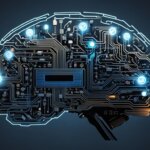Table of Contents
Machine learning algorithms are a subset of artificial intelligence that use statistical models and algorithms to enable computer systems to improve their performance on a specific task by learning from data.
What is machine learning algorithms? In simple terms, it is a method of teaching computers to recognize patterns in data and make decisions based on those patterns. This ability makes machines capable of performing tasks that previously required human intelligence, such as speech recognition, image processing, and decision-making.
Understanding machine learning algorithms is essential for anyone interested in the field of artificial intelligence as they are the building blocks of the technology. In this section, we will dive into the concept of machine learning algorithms and gain a comprehensive understanding of their purpose and functionality.
Key Takeaways
- Machine learning algorithms enable computer systems to learn from data and improve their performance on a specific task over time.
- They are a key subset of artificial intelligence and have numerous applications across different industries.
- Their types include classification, regression, clustering, and reinforcement learning algorithms.
- Machine learning algorithms can be challenging to develop and implement due to their complex nature and need for large amounts of data.
- As the technology advances, machine learning algorithms will continue to shape the future in remarkable ways.
Types of Machine Learning Algorithms
In the field of artificial intelligence, machine learning algorithms are categorised into various types, each serving a unique purpose and function. In this section, we will explore the different types of machine learning algorithms and provide insights into their workings and applications.
Classification algorithms
Classification algorithms are used for separating data into different classes or categories based on their characteristics. One of the most common examples of classification algorithms is the K-Nearest Neighbours (KNN) algorithm, which classifies data points by finding the closest related data points in the same category. Another example is the Support Vector Machine (SVM) algorithm, which finds the hyperplane that best separates the data into the different classes.
Regression algorithms
Regression algorithms are used for predicting continuous values based on data points. Linear regression is a commonly used algorithm that predicts a continuous output based on the linear relationship between the input and output variables. Another example is the Polynomial Regression algorithm, which predicts the values of a dependent variable based on the polynomial relationship between the independent and dependent variables.
Clustering algorithms
Clustering algorithms are used for grouping data points that share similar characteristics. A commonly used clustering algorithm is the K-Means algorithm, which groups together data points based on their proximity to the center of the cluster. Another example is the Hierarchical clustering algorithm, which creates a cluster tree, or dendrogram, of the data points based on their similarity.
Reinforcement learning algorithms
Reinforcement learning algorithms are used for training AI models to make decisions based on rewards and punishments. The Q-Learning algorithm is one such example, where the agent, or the AI model, learns to make decisions by maximizing the rewards and minimizing the punishments associated with each decision.
Understanding the different types of machine learning algorithms is crucial in selecting the appropriate algorithm for specific applications.
Applications of Machine Learning Algorithms
Machine learning algorithms have found diverse applications in a wide range of industries, revolutionizing processes and operations, and improving performance and efficiency. Let’s take a look at the various fields where machine learning algorithms have made significant impacts:
Healthcare
In the healthcare industry, machine learning algorithms have been used for a variety of tasks such as early disease detection, personalized treatment plans, and drug discovery. The ability to analyze large amounts of medical data with greater accuracy and speed has helped healthcare professionals make better diagnoses and treatment decisions, resulting in improved patient outcomes. For example, researchers are exploring the use of machine learning algorithms to analyze chest X-rays and CT scans to diagnose COVID-19 more efficiently.
Finance
Machine learning algorithms have transformed the finance industry by enabling more accurate predictions, fraud detection, and portfolio optimization. Financial institutions can use machine learning algorithms to determine credit risk, detect fraudulent transactions, and identify investment opportunities. For example, machine learning algorithms are used to analyze large amounts of data and identify potential insider trading cases more efficiently.
Marketing
Machine learning algorithms can be used to improve marketing strategies by analyzing consumer behavior and identifying patterns. This information helps companies tailor their campaigns and product offerings to the needs of their customers, resulting in higher conversion rates and sales. For example, retailers use machine learning algorithms to analyze customer purchase history and provide personalized product recommendations.
Autonomous Vehicles
Machine learning algorithms play a crucial role in the development of autonomous vehicles by enabling them to learn and adapt to various driving scenarios. Self-driving cars use machine learning algorithms to interpret data from sensors and cameras and make real-time decisions, such as adjusting speed or changing lanes. For example, Waymo, a subsidiary of Alphabet Inc., uses machine learning algorithms to train its vehicles to detect and respond to different driving situations more effectively.
“Machine learning algorithms have immense potential to drive innovation and transform industries across the board, from healthcare to finance and beyond. By leveraging the power of machine learning algorithms, organizations can achieve greater efficiency, accuracy, and innovation, paving the way for a brighter future.”
Conclusion
In conclusion, this article has provided an overview of machine learning algorithms, discussing their purpose and functionality. We also explored the various types of machine learning algorithms, such as classification algorithms, regression algorithms, clustering algorithms, and reinforcement learning algorithms, providing examples of their applications. Additionally, we examined the diverse applications of machine learning algorithms across different industries, including healthcare, finance, marketing, and autonomous vehicles.
It is evident that machine learning algorithms have the potential to transform industries and drive innovation in the field of artificial intelligence. As further advancements and refinements are made, we can expect to see machine learning algorithms continue to shape the future in remarkable ways.
FAQ
What are machine learning algorithms?
Machine learning algorithms are computational models and techniques that enable machines to learn from data and improve their performance over time without explicit programming. These algorithms are designed to analyze large amounts of data, identify patterns, and make predictions or decisions based on the learned patterns.
How do machine learning algorithms work?
Machine learning algorithms work by training on a dataset, which contains input variables (features) and their corresponding output variables (labels). During the training phase, the algorithm learns the underlying patterns in the data and adjusts its internal parameters to optimize its performance. Once trained, the algorithm can make predictions or decisions on new, unseen data.
What are the types of machine learning algorithms?
There are several types of machine learning algorithms, including classification algorithms, regression algorithms, clustering algorithms, and reinforcement learning algorithms. Classification algorithms are used to categorize data into predefined classes or categories. Regression algorithms are used to predict continuous numerical values. Clustering algorithms are used to group similar data points together. Reinforcement learning algorithms learn through trial and error interactions with an environment to maximize a reward signal.
What are the applications of machine learning algorithms?
Machine learning algorithms have a wide range of applications across various industries. In healthcare, they are used for disease diagnosis, personalized medicine, and drug discovery. In finance, they are used for fraud detection, credit scoring, and algorithmic trading. In marketing, they are used for customer segmentation, recommendation systems, and sentiment analysis. In autonomous vehicles, they are used for object detection, path planning, and decision-making.
What are the benefits and challenges of using machine learning algorithms?
The benefits of using machine learning algorithms include improved accuracy and efficiency in decision-making, automation of repetitive tasks, and the ability to handle large and complex datasets. However, there are challenges, such as the need for high-quality and diverse training data, algorithm bias, interpretability and transparency issues, and the potential for ethical implications and privacy concerns.







